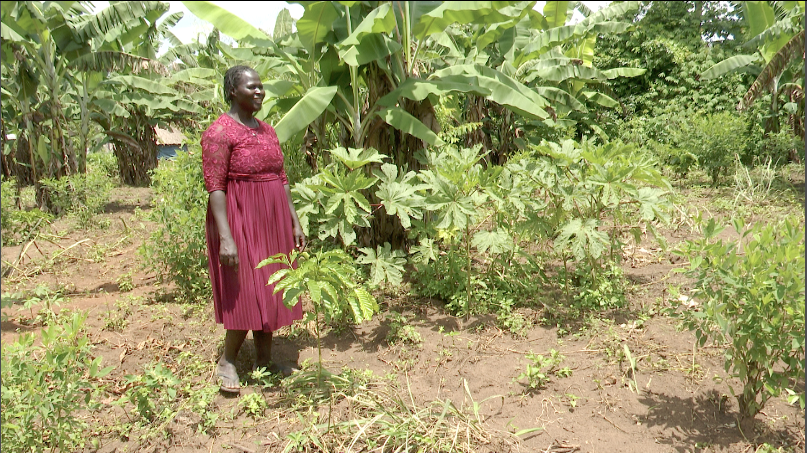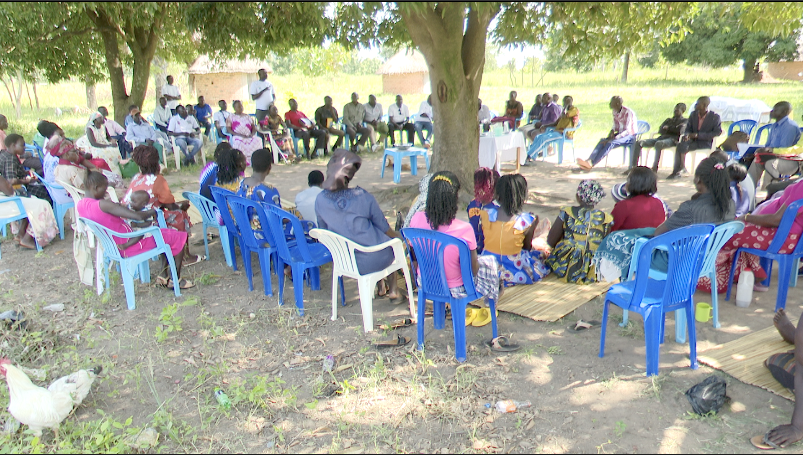Secure land rights to strengthen food security

Josephine Masudio in her 100-acre farm. PHOTOS | ANDREW SSENONO KAGGWA
What you need to know:
- When women have secure land rights, efforts to tackle climate change are easier to handle because they make up the largest percentage of farmers. Women, by the nature of their roles are the most affected by the effects of climate change, and are also crucial in ensuring immediate solutions to climate justice as Gillian Nantume writes.
Agriculture is the backbone of Uganda’s economy, with more than 60 percent of the population - most of them women and girls – are engaged in some form of farming. However, over the years, the impacts of weather variations and climate change are leading to food insecurity in some parts of the country.
Unfortunately, fewer than 40 percent of the women who practice agriculture have control over or own the land on which they farm; yet land ownership is at the centre of fighting the effects of climate change. However, for women in Ma’adi culture there is a beacon of hope.
On 100 acres of land, Josephine Masudio, a former primary school teacher, practices agroforestry. The land, located in Zoka Central village, Zoka Parish, Itirikwa sub-county, in Adjumani District, is divided into 38 acres for trees and 68 acres for crops such as, maize, onions, groundnuts, and cassava.
The trees she planted include eucalyptus, teaks, pines and musizi (umbrella tree) species, which she intends to lumber in the future.
“I have also planted coffee and custard trees which will start fruiting later this year. I planted 100 stems of cocoa early this year but most of them died. On Thursday I went to Koboko District, where the area Member of Parliament was launching a cooperative and acquired some knowledge on cocoa growing. Now, I want to plant 2,000 cocoa trees,” she says.

Allii clan members during a recent meeting.
Near her home, Masudio, who has been a farmer for the last ten years, is rearing 400 chicken, with plans to add 600 more next week. With seven workers on her farm, Masudio is a living example of the fact that secure land rights for women can ensure food security.
“I was given the land on which I farm, although I do not have an official land title,” she says, adding, “I have a written agreement with the clan leaders, witness by the local authorities. When I retired from the teaching profession, I approached my local and clan leaders and expressed interest in farming the land. Although I am a woman, they respected me and granted my request,” she says.
Masudio adds that there were 300 community members present when the leaders allocated her the 100 acres. She says there are a number of women in her community who have also been allocated large tracts of land to carryout farming.
“If they see that a woman has the potential to add to the development of the community, they will give her land, as long as she respects their decisions. Our people have woken up to the fact that women work harder than men to bring about socioeconomic development,” she says.
The mother of two says in 2018 when she began rice farming, she earned Shs6 million. When she planted acres of soya in 2019, she earned Shs19 million that year. This year, so far, she has harvested 18 sacks of groundnuts and 100 sacks of sunflower.
“I feel the Ma’adi have began looking at girls and boys equally in terms of land allocation. Our traditions softened in the late 1990s when people started allowing themselves to see the potential of the girl child. And the women who are passionate about farming are reaping the results,” Masudio says.
Through farming, Masudio, a single mother, has managed to educate her two children to the tertiary level. Her daughter is a diploma student at Bukalasa Agricultural College and is poised to inherit her mother’s farm, affirming that women’s land rights can uplift the position of the girl child in a community. Such has been Masudio’s success that she intends to adopt needy children to look after now that her own are grown.
Women land rights among the Ma’adi
While land is customarily owned in Adjumani district, Ben Chandiga, the head of the Allii clan in Ofua sub-county, affirms that the Ma’adi culture respects women’s rights regardless of whether they are wives or daughters in a home.
“The family allows a widow to take over her husband’s land. Even girls who leave in their marriages are allocated land for their own use. Of course, this is customary land but in this clan, girls have been given land on which they have built houses,” he says.
Chandiga says the women’s children can inherit the land allocated to their mothers, even if they do not belong to their mother’s clan.
“However, their inheritance depends on their discipline and obedience to our norms. When they begin adhering to their father’s clan, then we cannot allow them to inherit our land. They must pay allegiance to our clan,” Chandiga stresses.
Lucy Flavia Toua is another farmer who has benefitted from the changed attitude of Ma’adi clan leaders. The fifty-acre farm she shares with her sister is located in Bayi village, Zoka Parish, also in Itirikwa sub-county.
“I grow bananas, beans, rice cassava and maize, most of which is for sale. The proceeds pay the school fees and other needs of our children. This land was given to us by my mother’s brother in 2018 after the land that my father left for us in Apaa village was taken over by the Acholi invaders,” she says.
Toua’s father produced six daughters and on his death, he bequeathed his 150 acres to them. Unfortunately, due to the Apaa conflict between the Ma’adi and Acholi tribes, the women cannot access the land.
“They (Acholi) do not want us to set foot on our land, and that is a big challenge to us. If we were farming that land, we would have made so much money by now. I would farm half of it and rent out the rest to sustain the family,” she says.
The land Toua’s uncle allocated to the women once belonged to their late mother.
“I do not personally own the land and Uncle can take it back anytime he wishes to do so. However, he is a lenient man who witnessed our suffering after the Acholi’s locked us out of our land,” she says.
The benefits
Toua, who has seven farm workers, has a produce shop in Awindiri market in Adjumani town where she sells most of the harvest from the farm. She also owns a restaurant, which sells only traditional food from her farm.
“Every six months, I make a profit of between Shs5 million and Shs 6 million from the crops, and Shs6 million from the 30 beehives in my apiary.
Much as both Toua and Masudio are reaping from their efforts, Chandiga says they cannot sell the land on which they toil or offer it as security to take out a bank loan to expand their farming operations or acquire modern farming technology.
“Women should benefit from the land by generating food and constructing a houses to live in. If such a time comes, as they must go away, we can allocate the land to other girls to also benefit. If we allow them to sell it or offer it as security for bank loans, where will other girls in the clan settle?” he asks.
Chandiga adds that while the women can rent out a portion of the land, if the clan leaders detect that they have started mismanaging it, they are at liberty take the land away.
“We can only divide our land when we have population pressure. Right now, we do not have that pressure. So, if a woman has come to seek refuge, she cannot own the land. Currently, we are carrying out customary lease mapping on our land and we have allowed some women to map land on their own, in their own names,” Chandiga adds.
The 2030 Agenda for Sustainable Development indicates that women can be as productive as men when given access to the same resources. Sustainable Development Goal Five calls for gender equality and empowerment of all women and girl, with part of it calling for an undertaking of reforms to give women equal rights to economic resources as well as access to ownership and control over land and other forms of property, inheritance and natural resources, in accordance with national laws.
However, the gap between international commitments and the situation on the ground needs to be addressed through gender transformative policies and concrete action if food security in communities is to be enhanced.
Masudio advises women who were never educated and those who are not employed to take advantage of the relaxation on the traditions around customary land.
“What is important is how you approach the clan leaders. Go to them when you are composed, disciplined, and with clear objectives in mind over what you want to do with the land you are requesting for. I do not think they can turn you away. However, if your plan is to sell off the land after acquiring it, that will anger our people,” she says.





